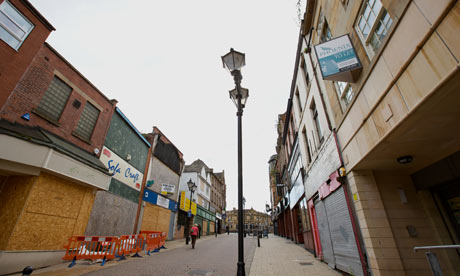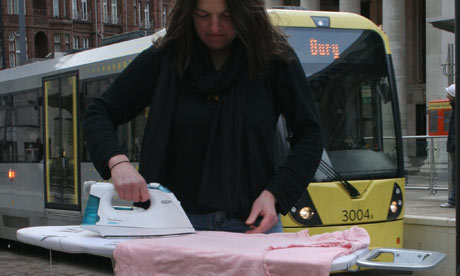 |
| Picture nicked from the Guardian |
The slow death of the High Street in the UK is plain for most to see. If it is not the closure of small businesses it is the homogenisation of the outlets that are trading successfully. Shopping habits have changed. People like to drive to out of town malls; shopping has become a leisure activity,
some would argue a religion, and of course shopping online is often cheaper with a larger choice than visiting a physical store.
So, can the High Street be saved? Indeed should it be saved? Well
David Cameron clearly thought this was a worthwhile thing to do so he did what politicians sometimes do when they have a problem; he got a celebrity to undertake an independent review for him and come up with a plan (
link to full 55 page PDF).
Enter Mary Portas - 'Queen of Shops and Frocks', TV personality and no doubt a very able person. She has made
28 recommendations which she feels will help. Similar initiatives have been done before though. As recently as 2009 the previous Goverment was
investing £3m to help turn boarded up shops into art galleries and the like, so I can't help but think this latest attempt encouraging local councils to make plans, changing planning rules and relaxing red tape will not make a huge difference either.
 |
| Mary Portas |
Who am I to criticise though? I shop online, my families main grocery shop is at Tesco and my wife loves a bit of 'retail therapy' every now and then. However, I also despair at the blight of empty and neglected shop units, the loss of community when they close and the environmental, societal and health costs in using cars to routinely go shopping.
I certainly don't see the High Street returning to the dominance it once had but would love to see a revitalised area for local shopping and community interaction, so I broadly welcome most of her plan. Some of the recommendations do rub me the wrong way though, particularly point 9 which states:
Local areas should implement free controlled parking schemes that work
for their town centres and we should have a new parking league table.
Now, writing a cycling based blog you might see where I am going with this. Encourage people to use cars to go shopping? Well even though I am an avid cyclist I do sometimes drive a car too. I also do not believe for one minute that cycling is a panacea for all ills. People need to drive on occasion for a variety of reasons. High streets provide everyday types of shop but also more specialised ones too. These can attract people from far and wide and sometimes the car is just the most convenient method to access these outlets.
Where I live there is an independent cheese shop, a specialist audio visual shop, a pet shop specialising in reptiles and a shop selling wigs. There are also three nice restaurants and one very nice, award winning one too (lucky me!). However, most of the shopping is of the mundane, everyday variety and I really do not want to encourage more people to travel by car to the area. Instead I want to encourage more local people not to use their cars to go elsewhere.
So, making car use easier and cheaper is never going to part of the solution in my book. High streets will never be able to compete with supermarkets and out of town malls which have vast amounts of free parking available. They need something else. Oh wait. Point 10 may be of help. This states:
Town Teams should focus on making high streets accessible, attractive and safe.
If this is not an argument for discouraging car usage and creating a more pleasant environment I don't know what is. Somewhere people feel safe to wander on foot, easily crossing traffic calmed streets while having a chat? Where crash barriers can be removed, pavements widened and raised road crossings installed? Adequate cycle parking provided and access optimised? And maybe, just maybe where cycling to the shops, cafe, library, etc is an attractive, viable option for local people?
Is this an unobtainable utopian dream I wonder? Well it's not even a dream for Mary. How many times did the report mention 'cyclist' 'cycling' or 'bicycle' in all of its 55 pages on saving the High Street? I don't pretend to have read it all but word searching the PDF document shows the answer is...not at all!
Increased car dominance and more unattractive, polluted, crowded and dangerous high streets. Just what really is not needed. I despair sometimes. I really do.






















